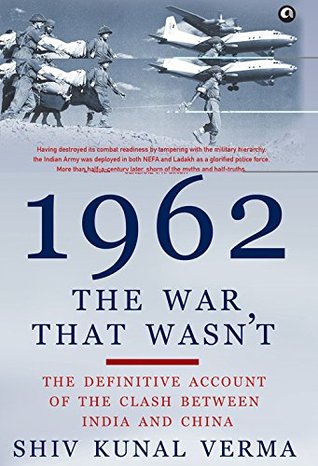
“The failure lay not in the Forward Policy but in forgetting the famous dictum ‘he who carries the big stick rules the roost’.”
~Kunal Verma, 1962: The War That Wasn’t
“Jiski lathi uski bhainss!” as the old saying goes. But problems arise if the lathi wielders are dumb as hell. This was a difficult book to go through, although it is well put together, well researched, direct and critical in it’s analysis and quite informative, but it’s never easy to read about defeat. Although it’s absolutely essential that we do read about it, “those who don’t learn from history…” and all that.
Other than the fact that we lost in 1962, I didn’t know much as to why, how and in those aspects I was really surprised. The political class and policy decisions take a big part of the blame, but our military leadership of the time, wasn’t exactly blameless either. That came as a surprise. Also whenever we/I think about the war I always thought in terms of Kashmir and the land we lost there, while in the book that sector comes in the last few chapters. Whereas a lot of the action took place in Arunachal Pradesh, hell the war started from there, and we lost almost all of that territory to the Chinese, the fact that they pulled back and let us have it back after declaring the ceasefire also amazes me, they might have had logistical and other reasons but the way and speed with which our forces folded was quite painful.
There are many takeaways from this book, first and foremost Politics and the Forces do not and should not mix after a fashion, there’s a limit, the moment favoritism enters the picture instead of merit in the defense forces as they’re permeating other places, we’ll be in deep shit again. The defense forces should have a substantial say on matters related to their field and their analysis should NEVER EVER be ignored on that front, their needs and demands should be considered on priority and with a lot of sensitivity. But aah all this is quite apparent, it’s always going to be difficult to find that perfect balance.
This took me quite a while to finish, there was a lot of information of places, deployments, the command structure, decisions and the actual battles, to absorb it all took a while. The way our Generals let us down, I mean Nehru is quite a soft target by now even thought that doesn’t absolve him of anything the point remains there were other things too that could have gone better, people who could have done better so that we wouldn’t have failed so spectacularly.
This was a great book, detailed in it’s showing and precise with it’s blow by blow. So many names, places , companies and structures might be a bit daunting to read but they do give a complete and wholesome picture. The analysis is unsparing in it’s criticism as it should be for such a loss. The lessons so drawn is I hope learnt well at all levels, because the times are such that a ’62 version 2 can’t be completely ruled out and we should be ready this time around.